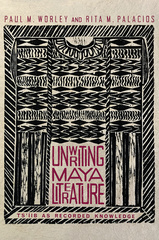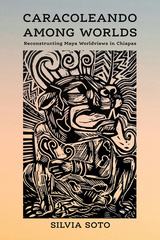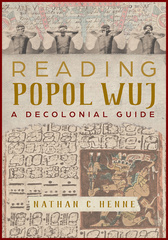Telling and Being Told
Storytelling and Cultural Control in Contemporary Yucatec Maya Literatures
The University of Arizona Press
Through performance and the spoken word, Yucatec Maya storytellers have maintained the vitality of their literary traditions for more than five hundred years. Telling and Being Told presents the figure of the storyteller as a symbol of indigenous cultural control in contemporary Yucatec Maya literatures. Analyzing the storyteller as the embodiment of indigenous knowledge in written and oral texts, this book highlights how Yucatec Maya literatures play a vital role in imaginings of Maya culture and its relationships with Mexican and global cultures.
Through performance, storytellers place the past in dynamic relationship with the present, each continually evolving as it is reevaluated and reinterpreted. Yet non-indigenous actors often manipulate the storyteller in their firsthand accounts of the indigenous world. Moreover, by limiting the field of literary study to written texts, Worley argues, critics frequently ignore an important component of Latin America’s history of conquest and colonization: The fact that Europeans consciously set out to destroy indigenous writing systems, making orality a key means of indigenous resistance and cultural continuity.
Given these historical factors, outsiders must approach Yucatec Maya and other indigenous literatures on their own terms rather than applying Western models. Although oral literature has been excluded from many literary studies, Worley persuasively demonstrates that it must be included in contemporary analyses of indigenous literatures as oral texts form a key component of contemporary indigenous literatures, and storytellers and storytelling remain vibrant cultural forces in both Yucatec communities and contemporary Yucatec writing.
Through performance, storytellers place the past in dynamic relationship with the present, each continually evolving as it is reevaluated and reinterpreted. Yet non-indigenous actors often manipulate the storyteller in their firsthand accounts of the indigenous world. Moreover, by limiting the field of literary study to written texts, Worley argues, critics frequently ignore an important component of Latin America’s history of conquest and colonization: The fact that Europeans consciously set out to destroy indigenous writing systems, making orality a key means of indigenous resistance and cultural continuity.
Given these historical factors, outsiders must approach Yucatec Maya and other indigenous literatures on their own terms rather than applying Western models. Although oral literature has been excluded from many literary studies, Worley persuasively demonstrates that it must be included in contemporary analyses of indigenous literatures as oral texts form a key component of contemporary indigenous literatures, and storytellers and storytelling remain vibrant cultural forces in both Yucatec communities and contemporary Yucatec writing.
This is the first broad look at oral stories in the context of literature written by and about Yucatec Maya people.’—Allen F. Burns, author of An Epoch of Miracles: Oral Literature of the Yucatec Maya
This is the first broad look at oral stories in the context of literature written by and about Yucatec Maya people.’—Allen F. Burns, author of An Epoch of Miracles: Oral Literature of the Yucatec Maya
“This book will do for Yukateko literature what Arturo Arias’ Taking Their Word has done for indigenous literature in Guatemala. Worley traces the important antecedents to this book specifically in the Yucatán region.”—Nathan Henne, translator of Time of Commences in Xibalbá
“This book will do for Yukateko literature what Arturo Arias’ Taking Their Word has done for indigenous literature in Guatemala. Worley traces the important antecedents to this book specifically in the Yucatán region.”—Nathan Henne, translator of Time of Commences in Xibalbá
Telling and Being Told is not what it is, but what it can become: a proposition for a new world through dialogue. This book offers the great possibility to reimagine Latin-American nation-states as plurilingual and pluricultural with the inclusion of indigenous citizen-subjects with agency instead of passive and mute objects notable to speak for themselves.’—Tessa Boeykens, Journal of Iberian and Latin American Research
Telling and Being Told is not what it is, but what it can become: a proposition for a new world through dialogue. This book offers the great possibility to reimagine Latin-American nation-states as plurilingual and pluricultural with the inclusion of indigenous citizen-subjects with agency instead of passive and mute objects notable to speak for themselves.’—Tessa Boeykens, Journal of Iberian and Latin American Research
Paul Worley has crafted a useful treatise on the respectful handling of storytelling traditions.’—Journal of Folklore Research
Paul Worley has crafted a useful treatise on the respectful handling of storytelling traditions.’—Journal of Folklore Research
An interesting and valuable work on the contemporary relevance of indigenous languages in the face of the persistent ideologies that cast indigenous literatures as being either irrelevant or simply ancestral to homogenizing national identities.’—American Anthropologist
‘The most important contribution of Worley’s book is the exhortation that researchers need to recognize Maya storytellers as powerful cultural critics and to heed and channel their voices.’—Journal of American Folklore
An interesting and valuable work on the contemporary relevance of indigenous languages in the face of the persistent ideologies that cast indigenous literatures as being either irrelevant or simply ancestral to homogenizing national identities.’—American Anthropologist
‘The most important contribution of Worley’s book is the exhortation that researchers need to recognize Maya storytellers as powerful cultural critics and to heed and channel their voices.’—Journal of American Folklore
Paul Worley is an assistant professor of Spanish in the Department of Modern and Classical Languages and Literatures at the University of North Dakota. His work has appeared in Chasqui and in the volume Resistant Strategies. Stories collected as part of his research are available at the website tsikbalichmaya.org.
Acknowledgments
1. Who Tells What to Whom and How: Orality, Literacy, and Cultural Control
2. Writing THE Word: Storytellers, Cultural Brokers, and the Shape of Indigenous Memory
3. Into the Archive: Cultural Brokers, Cultural Control, and Writing Oral Maya Literature in the Twentieth Century
4. “I’ll tell you the story . . .” : Mariano Bonilla Caamal and Storytelling as Cultural Control
5. Telling Maya Modernity: The Works of María Luisa Góngora Pacheco, Ana Patricia Martínez Huchim, and Briceida Cuevas Cob
Appendix 1: “The Dwarf of Uxmal” as told by Luis Gonzaga (José May)
Appendix 2: “The Dwarf of Uxmal” as told by Humberto Bonilla Caamal
Appendix 3: “The Story of Juan Rabbit” as told by Mariano Bonilla Caamal
Notes
Works Cited
Index
















